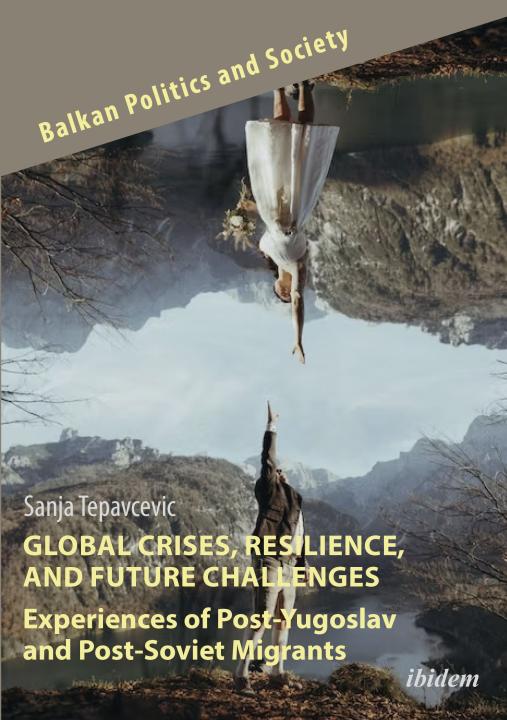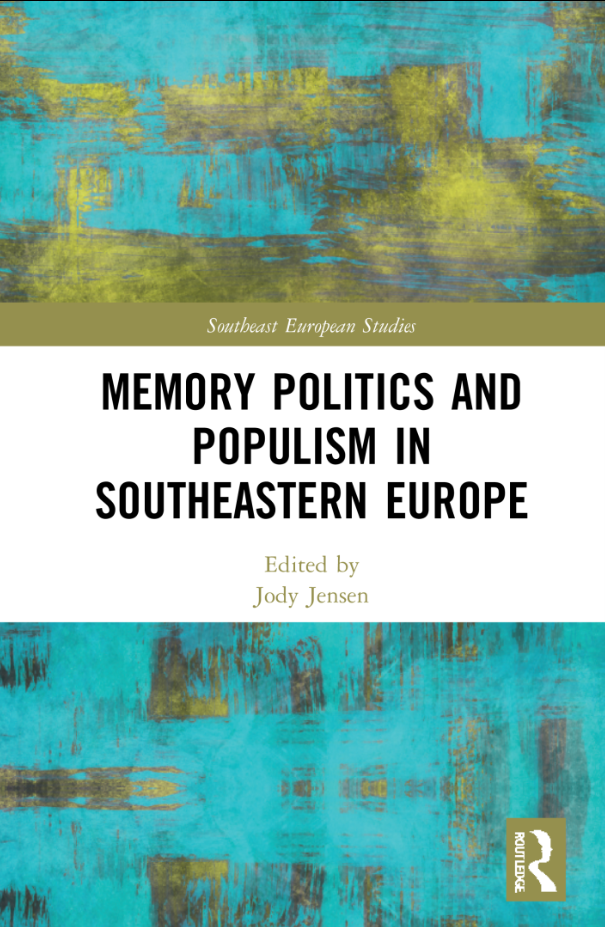
Influencers, Online Alliances and Reconciliation in Southeast Europe
A brand new, groundbreaking book was released, titled Influencers, Online Alliances, and Reconciliation in Southeast Europe: #Balkans written by Ivana Stepanović, iASK fellow.
The EU-Balkan Observatory, an initiative by the Institute of Advanced Studies Kőszeg (iASK), is dedicated to exploring the geographic and cultural complexities of the Balkan region in the European context. With a rich history of research, iASK has maintained a strong focus on the Balkans, particularly through its Polanyi Centre, which between 2015 and 2023 facilitated a vibrant Balkan study group. This group was instrumental in producing more than 200 publications, including monographs, research papers, and working papers. The institute’s commitment to this region reflects its belief in the importance of understanding the Balkans’ unique historical, political, and social dynamics, which continue to shape the broader landscape of Southeastern Europe.
The EU-Balkan Observatory will serve as a hub for disseminating iASK’s ongoing research and initiatives related to the Balkans. The webpage will feature new research projects, publications, policy papers, and updates on relevant topics such as history, memory politics, populism, reconciliation efforts, EU integration, and environmental activism in the region. By providing access to the latest findings and discussions, the Balkan Observatory aims to contribute to a deeper understanding of the challenges and opportunities facing Southeastern Europe. Visitors will also find calls for papers, conference announcements, and news from the broader region, making the Balkan Observatory a vital resource for scholars, policymakers, and anyone interested in the complex dynamics of the Balkans.
Introducing Snapshots—brief summaries of individual research projects within the EU-Balkan Observatory platform, showcasing the innovative work of iASK research fellows. These concise overviews offer insight into key studies addressing the complexities of the Balkan region within the broader European context.
The EU–Balkan Observatory Highlights 2024-2025 offers a panoramic view of a region in transformation, where Europe’s shifting borders, political futures, and social imaginations converge.
iASK Snapshot: Formation in Resistance: Reclaiming Political Agency in Serbia By Aleksandra Bulatović, Associate Research Professor, Institute for Philosophy and Social Theory
University of Belgrade, Serbia
iASK Policy Brief: Navigating Diversity Management, Memory Politics, and EU Integration in the Western Balkans
iASK Policy Paper: Laying the Groundwork: From Fragmentation to a Joint Soft Power Strategy for Southeast Europe

A brand new, groundbreaking book was released, titled Influencers, Online Alliances, and Reconciliation in Southeast Europe: #Balkans written by Ivana Stepanović, iASK fellow.

A brand new book was published, written by Sanja Tepavcevic, iASK associated fellow and was released by Ibidem Press in 2024.

This book explores the politics of memory in Southeastern Europe in the context of rising populism and their hegemonic grip on official memory and politics.
Introducing the EU-Balkan Observatory Repository, a carefully curated platform dedicated to providing in-depth resources on the politics, history, and cultural dynamics of the Balkans. This repository brings together a diverse selection of books, artworks, documentaries, scholarly papers, and essential legal documents, including frameworks like the EU accession plan for the Western Balkans. Serving as a key resource, the EU-Balkan Observatory offers essential insights and critical perspectives for those seeking to understand the complexities and transformations shaping the Balkan region today.
iASK research fellow Elira Luli authored a perspective chapter titled “The Illiberal Social Contract in the Western Balkans – A Silent Threat to EU Norms and Stability,” published as an open-access, peer-reviewed chapter in the edited volume European Union – Ideas for the Future (IntechOpen, 2026), edited by Helder Ferreira do Vale. The chapter examines the emergence of illiberal governance patterns in the Western Balkans and their implications for European Union norms, enlargement policy, and regional stability.
iASK Research Fellow Rubin Zemon has published a working paper Diversity Management, Culture of Memories and EU integration processes in the Western Balkans.
Dzenita Siljak and Kristian Nielsen have published a paper Growth without development: institutional barriers to convergence in EU candidate states in the Eastern Journal of European Studies. This research analyzes the effect of institutions on economic growth in eight EU candidate transition countries.
This article, titled The Montreux Convention in the New Geopolitical Context of the Black Sea, by Kıvanç Ulusoy, explores the contemporary relevance of the Montreux Convention in light of shifting regional geopolitics. The paper examines how the dissolution of the Soviet Union and evolving global dynamics have prompted debates over the convention, emphasizing the need to balance Turkish sovereignty, economic transit rights, and Black Sea security. Read the paper here: The montreux convention: a key for understanding the geopolitics of the Eastern Mediterranean and Black Sea: Southeast European and Black Sea Studies: Vol 0, No 0 – Get Access
This European Commission page provides comprehensive information about the EU’s enlargement process and strategies for the Western Balkans. It includes key publications such as factsheets, the Western Balkans Strategy brochure, and country fiches. For all relevant details and updates, including major reports specific countries, you can visit the page here.
Sava is a river movie, a documentary film and a 990 km journey through countries once united under the umbrella of Yugoslavia. In this film nature has a voice (Mira Furlan), conversing with her people they explore a complex relationship between nature, identity and nationhood. The film not only celebrates the river’s natural beauty but also examines how rivers like the Sava transgress political borders, challenging the divisive narratives often imposed by nation-states. Sava becomes a journey of healing and understanding, offering a unique lens through which to reflect on past conflicts and consider the enduring connections that flow through the heart of the Balkans.
Aida Šehović’s performance Što Te Nema serves as a powerful and moving tribute to the victims of the Srebrenica genocide. This traveling installation, made up of thousands of collected coffee cups (fildžani), creates a temporary memorial that invites viewers to honor the memory of those lost. Through communal participation and a symbol of shared cultural rituals, Što Te Nema transcends borders, fostering collective remembrance and a call for justice.
Slavenka Drakulić’s War Is the Same Everywhere was published in 1999 and is available in multiple languages, including English and Croatian. As a Croatian author, Drakulić was a prominent voice in the 1990s, often critiquing nationalism and war in the former Yugoslavia, which made her a controversial figure in the Croatian public sphere during that time. The book reflects her critical stance on war’s universal brutality, drawing from her experiences during the Yugoslav Wars. Read more: War Is The Same Everywhere – Slavenka Drakulić (slavenkadrakulic.com)
Flašaroši (2023), a Serbian-Slovenian co-production, is a poignant exploration of life in the Balkans, capturing the complexities and shared histories of the region. Through its intertwining stories, the film reflects themes of resilience, cultural identity, and the nuances of post-conflict realities, offering audiences a rich, multi-layered perspective on the Balkans. This cinematic collaboration serves as an important cultural bridge, fostering understanding and connection across borders. Read more in Slovenian: Apokaliptična scenografija, epski kadri in sporočilo: Stekleničarji slavili na Dokudocu – RTV SLO
The story of October 5, 2000, in Serbia is much more nuanced than just the overthrow of Slobodan Milošević. This documentary reveals how the Bulldozer Revolution unfolded, who the key actors were, and why many believe it didn’t really succeed, as the 6th of October 2000 never truly arrived. Watch the documentary in Serbian language: Konačni obračun – dokumentarni film o Petom oktobru ili kako je srušen Milošević (youtube.com)
Proposed plans for lithium mining in Serbia sparked large protests led by ecological activists. This paper critically examines the impact of lithium mining on environment based on the research of test drills in the Jadar Valley in Western Serbia conducted by the mining company Rio Tinto. Read the full article in the Scientific Reports journal: The influence of exploration activities of a potential lithium mine to the environment in Western Serbia | Scientific Reports (nature.com)
iASK research fellow Elira Luli authored a perspective chapter titled “The Illiberal Social Contract in the Western Balkans – A Silent Threat to EU Norms and Stability,” published as an open-access, peer-reviewed chapter in the edited volume European Union – Ideas for the Future (IntechOpen, 2026), edited by Helder Ferreira do Vale. The chapter examines the emergence of illiberal governance patterns in the Western Balkans and their implications for European Union norms, enlargement policy, and regional stability.
iASK research fellow Elira Luli authored a paper titled “Small States and Choices: Gambling on Security or Regional Cooperation under a Common Banner?” published in Connections: The Quarterly Journal, Vol. 23, No. 4 (2024). The paper examines the strategic dilemmas small states face—specifically whether to prioritize security or pursue regional cooperation under a shared identity.
iASK Research Fellow Rubin Zemon has published a working paper Diversity Management, Culture of Memories and EU integration processes in the Western Balkans.
New paper by iASK research fellow Dzenita Siljak analyzes how two major economic downturns—a recession and a stagflation—affected convergence in the European Union (EU). Read the full paper here: “Crises Around the World
Deeper”—But How Do They Impact EU Convergence?
Blog Post: iASK associate fellow Dzenita Siljak has published a blog post on the Regional Studies platform: Institutions and Convergence: Why Have EU Candidates Lagged Behind? – RSA Main
Book review: iASK research fellow Rubin Zemon wrote a review of Sanja Tepavcevic’s book “Global Crises, Resilience, and Future Challenges. Experiences of Post-Yugoslav
and Post-Soviet Migrants” published by ibidem-Verlag.
Conferences: Ivana Stepanovic, research fellow at iASK, presented her book “Influencers, Online Alliances and Reconciliation in Southeast Europe: #Balkans” at two major international conferences: the ASEN Conference in Budapest and the ASN World Convention at Columbia University in New York. Her work highlights the role of social media in fostering cross-border cooperation and reconciliation in the post-conflict Balkans.
New paper: This article, titled The Montreux Convention in the New Geopolitical Context of the Black Sea, by Kıvanç Ulusoy, explores the contemporary relevance of the Montreux Convention in light of shifting regional geopolitics. The paper examines how the dissolution of the Soviet Union and evolving global dynamics have prompted debates over the convention, emphasizing the need to balance Turkish sovereignty, economic transit rights, and Black Sea security. Read the paper here: The montreux convention: a key for understanding the geopolitics of the Eastern Mediterranean and Black Sea: Southeast European and Black Sea Studies: Vol 0, No 0 – Get Access
New release: In his book Ankommen, renowned political scientist Vedran Džihić recounts his experiences growing up as a Bosnian refugee in Austria, and tells a story how he ultimately became a scholar. Today, he is a senior researcher at OiiP (Vienna), lecturer at the University of Vienna, Co-Director of the Center for Advanced Studies (Rijeka) and member of BiEPAG. Click here to buy the book in German, and here to listen to the podcast in German.
New release: iASK research fellow Ivana Stepanovic’s new book Influencers, Online Alliances and Reconciliation in Southeast Europe: #Balkans will be available for pre-order from 18th of November 2024: Influencers, Online Alliances and Reconciliation in Southeast Europe: (routledge.com)
New paper: In the article titled From Patriotism to Transnationalism: Exploring Hashtag Narratives on Lithium Mining Protests in Serbia, iASK research fellow Ivana Stepanović investigates the diverse narratives surrounding lithium mining protests in Serbia. Utilizing digital ethnography and narrative analysis, the study examines how ecology activists on the social platform X (formerly Twitter) employ hashtags to frame the lithium mining issue within broader political and cultural contexts, highlighting the fluidity of online activism across the political spectrum. Read the paper here: From Patriotism to Transnationalism: Exploring Hashtag Narratives on Lithium Mining Protests in Serbia | Nationalities Papers | Cambridge Core
iASK in the news: iASK research fellow Rubin Zemon spoke for Voice of America about the “Balancer”, a digital tool that calculates the exact number of ethnic-minority employees required in each public body in North Macedonia. See the video in Macedonian language: Ќе се изнајде ли замена за Балансерот? (youtube.com)